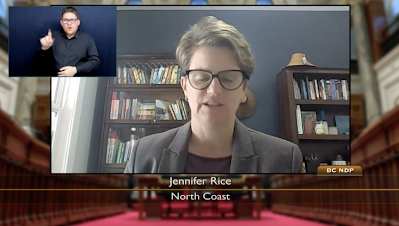British Columbians received the financial blue print for the years ahead as Finance Minstar Katrine Conroy delivered her first Provincial Budget and the first for the fellow who promoted her last fall Premier David Eby.
Minister Conroy rose in the Chamber to make her first comments, delivering her path towards the future, the presentation taking just 34 minutes to chart for those in the Chamber and watching at home.
The Finance Minister introduced her financial plan as follows:
"Today I'm honoured to present Budget 2023.
A budget that builds today for a stronger tomorrow.
That eases the pressures that we feel in our daily lives and that reflects the priorities of British Columbians.
This years budget will improve health care, build more homes, help with rising costs and make our communities safer.
Budget 2023 will continue our work to build a stronger, cleaner economy for everyone, right across our province.
Mr. Speaker, these uncertain times require careful thoughtful action.
Action that addresses the uncertainty ahead, while moving us forward on long standing priorities.
Like reconciliation, climate change and tackling global inflation.
Action is what British Columbians want from their government and its what Budget 2023 delivers with real results focused on the priorities of British Columbians" -- Finance Minister Katrine Conroy's introduction to Budget 2023
Towards those goals, the BC government will continue to spend money, moving the province from surplus to deficit, all while the global financial picture becomes stormy with challenges anticipated in the year ahead.
The shift form surplus to deficit will see the province hosting a 4.3 million dollar deficit for 20230-24, 3 billion for 2024-25
Among some of the highlights for that spending for 2023 and beyond include:
Expansive funding for Health care, which received the larges volume of monetary note from the budget speech.
Almost $6.4 billion in new investments over three years will strengthen public health care and help people find and stay connected to the care they need. This includes funding to significantly improve cancer care, build up B.C.’s health-care workforce with new training seats, and create better supports for health-care workers and family doctors. This also includes $1 billion in new funding to expand mental-health and addictions services.Housing and homelessness also is set to see additional funding from the Budget:
Budget 2023 takes more action to get people into homes they can afford, providing an additional $4.2 billion in operating and capital funding over three years – the largest three-year housing investment in B.C. history – for more homes for people who rent, Indigenous people and middle-income families, along with new actions to tackle homelessness.
The much discussed Renter's Rebate is also now ready to be introduced
Moderate- and low-income renters in B.C. will be eligible for as much as $400 a year through a new income-tested renter’s tax credit starting in 2024. The credit will help more than 80% of renter households.The province has put aside 1.3 billion in new funding for a range of initiatives over the next three years:
This includes giving free prescription contraception for B.C. residents, expanding existing K-12 school food programs, and providing more financial supports for post-secondary students, people receiving income and disability assistance, and foster families and other caregivers.She also noted of the province's assistance for communities particularly in the area of infrastructure, reviewing the previously announced Growing Communities Funding that will see 1 billion dollars available for the provinces municipal and regional district governments to share in.
Capital spending will also a significant jump, from 12.17 billion dollars from 2022-2023, to 15.8 billion for 2023/2024.
There will be some tax increases coming our way, among them the Carbon Tax in BC will rise by 65 dollars per tonne on April 1st and could rise to 170 per tonne by 2030.
The full information sheet from the Finance Office can be reviewed here.
You can also dig a bit deeper into the financial plan from this feature page from the Ministry of Finance website.
The Finance Minister's presentation can be reviewed below:
Check back later this evening as we compile the findings of the province's journalists, columnists and opinion makers as they review and explain the government's financial planning for the years ahead.
Those notes will be presented below:
BC Budget: Renters' rebate, welfare boost, expanded tax credits among affordability measures
BC Budget: $462 million earmaked for public safety, including 250 new RCMP officers
BC Budget: Province becomes first in Canada to offer free prescription contraception
BC Budget: $4.2B deficit forecast amid new program spending, economic headwinds
BC Budget: Student loan maximums doubled, repayment terms eased
BC's budget rings up $4.2 billion deficit, carbon tax to fund new housing and health care spending
BC's budget forecasts revenue from forestry sector to tumble amid industry slump
BC budget forecasts years of deficits, but spends bi on health, housing, families
$4.2 billion deficit forecast as BC budget keeps spending to tackle affordability crisis
BC Budget 2023 bets focus on tax credits and rebates will work amid continued housing uncertainty
Maximum BC climate tax benefit set to more than double: budget
BC budget to pay for free contraception
BC NDP mostly delivers on renters' rebate promised in 2017 - as a tax credit
BC budget predicts years of deficits as spending on health and housing hiked
BC Budget 2023: What the $4.2 billion deficit funds - and what it doesn't
BC Budget: Some financial relief for families, but not all will benefit
NDP leaves plenty of wiggle room in budget 2023-24
Budget includes $4.6B in new funding for health care and training in BC
BC budget promises help for renters, free contraception and increased health spending
BC Budget focuses on increasing treatment options in Toxic Drug Crisis
Budget includes spending on housing, health and to cushion rising cost of living
Spending much more than we have
Health budget includes free contraception, $1 billion boost for mental health and addictions
'Beacon of Hope;" BC advocates cheer free contraception promise in 2023 budget
Deficits and government spending highlight the 2023 British Columbia budget
Provincial budget earmarks $868 million for mental health and addictions services
More notes from the Legislature can be reviewed here.
Cross posted from the North Coast Review.






















